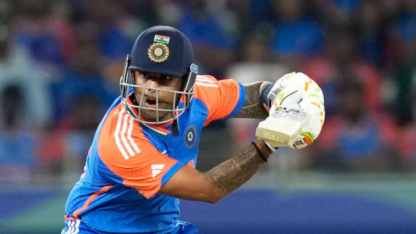After the Paris Olympics, star men’s singles shuttler Lakshya Sen is making his comeback at the Arctic Open. After a good three-month break, the shuttler is refreshed and looking to make a fresh start as he begins preparations for the LA 2028 Olympics.
The Indian shuttler had a disappointing campaign at the Paris Olympics, where he missed a medal by a whisker. First, in the semi-finals, he lost to the eventual gold medalist Viktor Axelsen. Later, in the bronze medal match, he struggled with consistency and missed the medal against Lee Zii Jia of Malaysia.
InsideSport had an exclusive conversation with Lakshya Sen’s coach U. Vimal Kumar to understand Lakshya’s playing style, future goals, and aspirations.
He needs to adapt to certain conditions
When asked, “How do you refine Lakshya’s shot selection and consistency?” Vimal Kumar said, “We’re working on getting more punch in his smashes, particularly in the latter stages of tournaments. As players progress through tough matches, their power and precision can drop, and that’s something we need to address.”
“Lakshya also needs to adapt better to conditions, especially dealing with drift when playing indoors. It’s a challenge many players face in Asia, but he needs to control the shuttle better in such circumstances. Consistency is key in men’s singles, and right now, the top 20-25 players are at a similar level. It’s gruelling, and you have to maintain that level across tournaments to stand out,” he added.
Lakshya’s energy levels are not a concern
In recent competitions, including the Paris Olympics, Lakshya was seen leading well against opponents. When asked if there was any issue with his energy levels, Vimal Kumar responded, “It’s not really about a lack of energy. The matches at this level are incredibly tough. When you’re playing three-setters from the first round itself, it’s exhausting. Ideally, you want to finish matches in two games when possible, but the depth of competition means that’s not always feasible.”
“Lakshya has exceptional reflexes, possibly the best in the world. When he’s in the zone, he’s very difficult to beat. If he can maintain his fitness and these reflexes towards the later stages of tournaments, he’ll be even more effective,” he added.
Editor's Pick
 Cricket
'Not out of form, out of position,' Robin Uthappa defends under fire Suryakumar Yadav
Cricket
'Not out of form, out of position,' Robin Uthappa defends under fire Suryakumar Yadav














































